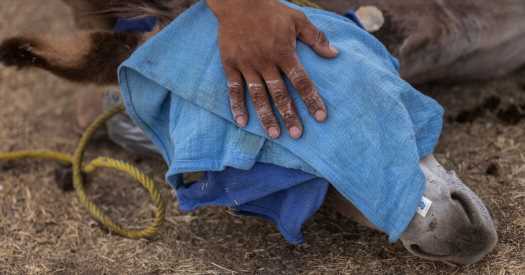
LAS PALMITAS, Mexico — Pedro Parra stood by his horse’s side as the animal dropped to the ground under the weight of anesthesia. Its four hooves flailed for a moment, then ceased, and a team of volunteer veterinarians rushed in. One placed a pillow under the patient’s neck; another tied a rope around a back foot and lifted it.
Their task was to castrate the stallion — a necessary surgery to keep the animal from becoming uncontrollable and a danger to its owner and to other animals. “He was getting a little bit restless around the mares,” Mr. Parra said. “He wasn’t at ease anymore.” Within the hour, seven more horses lay on the plot of land behind the town’s church, slowly waking from their surgeries.
Mr. Parra was turning 34 that day. As soon as his companion woke up, he would take the animal home, where it helps plow the milpa — rows of corn, beans and squash — on his family’s farm.
Mr. Parra’s stallion was one of the 813 patients, including donkeys, horses and mules, that were castrated, dewormed, vaccinated or otherwise treated during a weeklong, roving veterinary clinic in Guanajuato state in Mexico.
The campaign was organized by the Rural Veterinary Experience Teaching and Service, or RVETS, a program that since 2010 has sent volunteer specialists and veterinary students to provide free care in remote areas of Mexico, Nicaragua and the United States where veterinarians are scarce.
“In the equine veterinary industry, nobody else cares about all the animals that are in the countryside,” said Dr. Víctor Urbiola, director of RVETS Mexico. “That’s why we focus on them.”
But RVETS does more than vaccinate animals or fix their teeth. The group has also changed the way that people treat the horses, mules and donkeys they rely on to fetch water, plow fields, ride competitively or go to school. At the clinic, Brenda Arias and Martín Cuevas Jr., both veterinary students, gently approached two mares and a colt. Syringes in hand, the students prepared to squirt a pale-yellow liquid — the anti-parasitic drug ivermectin — into the animals’ mouths. Some rural horses, unfamiliar with people other than their owners, “won’t even let themselves be touched,” Ms. Arias said. What to do, then? “Seduce them,” Mr. Cuevas said. “Talk to them nicely, pet them” — an unfamiliar tactic to an earlier generation. Having grown up in a family of Mexican horse riders, or charros, Dr. Urbiola was taught that inflicting pain and fear was the way to dominate, or break, a horse. Had he been seen petting a horse, Dr. Urbiola said, he would have been derided. José Estrada, the deputy veterinarian at the clinic, blamed “our macho culture” for those negative attitudes. Juan Godínez, the elected delegate for the Las Palmitas community, said that before RVETS, some owners would lasso a horse’s legs and head and castrate the animal with a knife. “Like that, à la ‘Viva México,’ without anesthesia,” Mr. Godínez said. It was not uncommon for an animal to bleed to death or die of infection. The RVETS clinic also fills a gap in veterinary training. At vet schools in Mexico and elsewhere, “there’s less and less emphasis on horses in favor of other things like companion animals, dogs and cats,” Eric Davis, who founded RVETS with his wife, Cindy Davis, said in a telephone interview. “What they teach you in school is one-third of what life in the countryside is really like,” said Dereck Alejandro Morín, 24, a veterinary student volunteering with RVETS. Many students graduate without ever having touched a horse. At the clinic, it’s all hands-on. Mr. Morín ditched a career in medicine after training with RVETS Mexico last year. “I do it for them, for the horses,” he said. But speaking with Estefanía Alegría that week convinced him that he also does it for owners like her. Ms. Alegría, 33, and her son, Bruno, traveled an hour from their house in the hills, which has no electricity or running water, to visit the clinic in Jalpa. Her husband, like most of their neighbors, had crossed the border to send money back from Texas. “Everyone left,” she said. Now, she and her children rely on their donkey — a 13-year-old animal with a crooked ear — and a horse named Sombra for almost everything. Her story, Dr. Urbiola said, resonated with one of his core missions: to care for animals “who are either worth very little or nothing at all economically but whose value to people’s lives is incalculable.” It is no easy task. Securing funds for the yearly campaigns has proved difficult. “When I’ve gone knocking on government doors, they say, ‘What for? I mean, donkeys are worthless,’” Dr. Urbiola said. Then there are security concerns. In 2019, RVETS Mexico decided to stop traveling to communities surrounding Xichú, Guanajuato, on the advice of local contacts who warned them that homicides there had risen sharply. Still, D. Urbiola said, “if we can help even one donkey that carries 80 kilos of water for an old woman, all the effort we make is totally worth it.” Victor J. Blue contributed reporting. Source: Read Full Article





